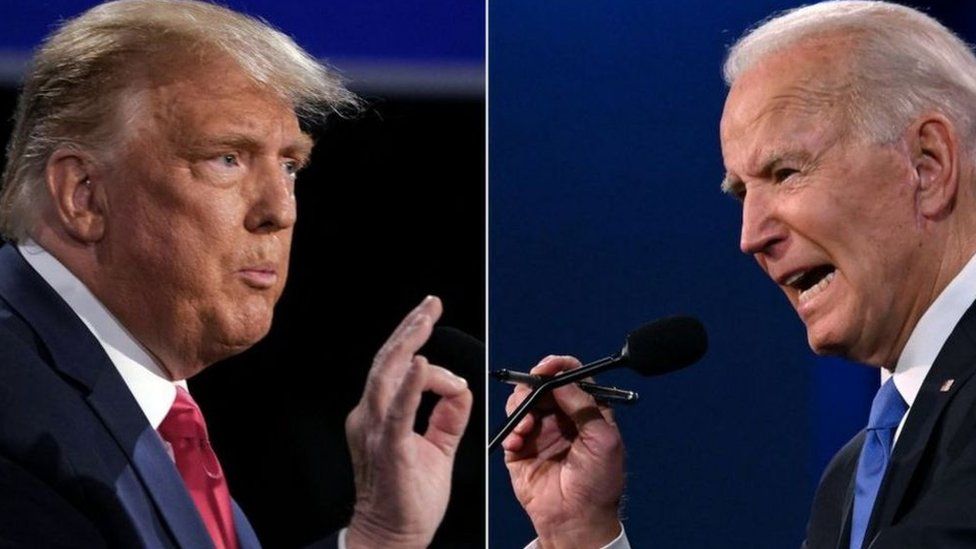Biden and Trump agree to June and September debates as RFK vies to qualify
- Published

Joe Biden and Donald Trump have agreed to hold two presidential TV debates in June and September, setting the stage for primetime political duels that could shake up the White House race.
CNN will host the first forum on 27 June in the key swing state of Georgia.
ABC will host the second one on 10 September.
The announcement came after President Biden, a Democrat, laid out his terms for debating his Republican predecessor ahead of November's election.
CNN said there would be no audience at June's debate in Atlanta, which will be moderated by hosts Jake Tapper and Dana Bash. It is scheduled unusually early for an election year.
ABC said its presenters, David Muir and Linsey Davis, would moderate the second debate, but the network has not specified a location.
Robert F Kennedy Jr, who is running as an independent, accused the two major candidates of colluding to exclude him.
But later on Wednesday he said on X, formerly Twitter, that he would meet the requirements to qualify for the CNN debate.
Mr Trump said on his social media platform Truth Social, external that he had also accepted an invitation from Fox News for a third bout on 2 October. However, Mr Biden's campaign chairwoman, Jen O'Malley Dillon, said the president had "made his terms clear for two one-on-one debates, and Donald Trump accepted those terms".
Trump-Biden debates a 'shocker' says debate chairman
Mr Biden proposed two televised debates in June and September. His rival quickly accepted, before suggesting they debate every month.
"We believe there should be more than just two opportunities for the American people to hear more from the candidates themselves," the Trump campaign said.
Both candidates have traded barbs on social media, with Mr Trump stating: "Just tell me when. Let's get ready to rumble!!!"
Mr Biden said Mr Trump was "free on Wednesdays" - a reference to his criminal trial in New York, while Mr Trump claimed his rival was the "worst debater" who "can't put two sentences together".
How these debates break with tradition
Mr Biden's proposal of two debates breaks several established traditions.
It bypasses the presidential debate commission, which since 1988 has scheduled timings and had already set dates and locations for debates in the autumn. There are typically three such TV clashes.
Mr Biden's team wants the two debates to be conducted with no live audience - another break with tradition.
Candidates would take turns answering questions from an agreed-upon moderator from a major news network, and the non-speaking candidate's microphone would be deactivated.
Ms Dillon said raucous partisan crowds were not "conducive to good debates".
But Mr Trump called for large audiences, saying "it's just more exciting" with a crowd.
Speaking to conservative radio host Hugh Hewitt, he also said the debates should last two hours, and the two rivals should be required to stand for the duration.
The first 2020 forum between the two candidates was marred by frequent interruptions and cross-talk. The second was cancelled when Mr Trump caught Covid and refused to take part by video link.
September 2020: Trump and Biden clash on future of healthcare
Can RFK qualify?
CNN's rules state that participants must appear on enough state ballots to gain the minimum 270 electoral votes required to win a US presidential election, and they must receive at least 15% support in four separate recognised polls - a high bar for a third-party hopeful like Robert F Kennedy Jr.
Mr Kennedy's campaign says he is now officially on the ballot in six states and has collected enough signatures to qualify for the ballot in eight more. All those states combined bring him closer to the electoral threshold, but only to 185.
His latest polling figures also appear to be slightly below the CNN guidelines, even though he is polling better than any third-party candidate since Ross Perot in 1996.
CNN has not yet commented on his claims of qualifying.
Earlier on Wednesday Mr Kennedy accused, external his opponents of trying to freeze him out "because they are afraid I would win". He has previously argued that White House elections are rigged in favour of the two main parties.
Mr Biden laughed when a reporter asked him on Wednesday if he wished to debate the independent candidate.
Why is the first debate so early?
By moving the debates earlier in the presidential campaign calendar, Mr Biden's proposal could lower any impact the TV clashes have on the outcome of the November presidential election, giving both candidates more time to recover from any poor performance.
Some past incumbent presidents - including Mr Trump, Barack Obama, George HW Bush and Ronald Reagan - have had shaky showings in their first general election debate before regaining their footing in subsequent meetings.
A June debate would take place before both the Republican and Democratic national conventions, while the September debate would be at least a month before election day. Surveys indicate many Americans do not begin paying attention to US presidential campaign news until the autumn.
Mr Biden also proposed a July vice-presidential debate that would take place after Mr Trump's running mate was nominated at the Republican convention in the summer.
The election-year presidential debates are typically broadcast on multiple US networks. At least 73 million Americans watched the first 2020 debate between Mr Trump and Mr Biden.
Mr Trump declined to participate in any Republican primary debates during this campaign, a point noted by Mr Biden in the video his campaign released announcing the debate proposal.
Mr Biden had minimal opposition in his bid for nomination this year, and the Democratic party held no primary debates.
- Published26 April